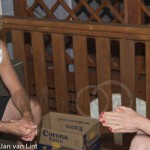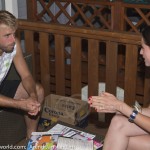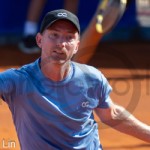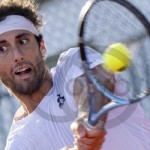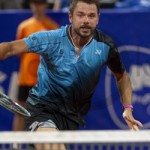MARACH: LIFE OF A TENNIS PLAYER CAN BE TOUGH
Oliver Marach, former number 82 in the singles and former number 8 in the doubles, is a friendly tennis player who took the time to tell us his intriguing story as a professional on tour for seventeen years. He has won 13 doubles titles and reached the semifinals of the Australian Open in 2009. However, his story shows that the life of a tennis prof is not all rosy. Marach had to deal with a lot of injuries, come backs and the difficulties of finding the right doubles partner. Today Marach still has the passion to play. This weekend he will even play the Dutch Davis Cup team in Kitzbühel. What can we learn from this experienced, upright and calm doubles specialist?
“I was lucky to have won a couple of titles in my career. While in the beginning I didn’t even know if I would become a professional tennis player.”
The road to the world top in doubles
What makes Marach so passionate about tennis? “The feeling when you win is amazing. Especially when you win a tournament. I was lucky to have won a couple of titles in my career. While in the beginning I didn’t even know if I would become a professional tennis player.” The Austrian player tells us that at the age of sixteen he did not even belong to the few top players of his country and he did not possess the best ground strokes at all. However, he was a fighter who was fast and athletic and who worked really hard. He travelled a lot and at the age of nineteen he went to Munich and after that he trained in Italy for three years. In that period he entered the singles top 100. Unfortunately, from that time on injuries spoiled Marach’s dream of living the life of a professional singles tennis player. After he had fallen back to place number 400 he bravely fought his way back into the top 100 again for two more years. But after that in September 2008 physical problems made him fall back to place number 300 again. The Austrian player now asked Lukasz Kubot to play a few tournaments together and that is how his doubles adventure took off.
Let’s now play the big ones
“Kubot and I played really good at the end of 2008. We won four out of five big challengers and got a good doubles ranking. We could even play Australia were we reached the semifinals!” Both players being ranked around the world top 30 in doubles, Marach encouraged Kubot to play the big ATP tournaments where they were now allowed. “But of course, my single was suffering. Sometimes I got in by qualifying, but that was it. Lukasz on the other hand even became number 40 in the singles as well.” The golden couple also reached the semifinals of the masters in Londen that year and in 2010 they won three more ATP titles.
“Doubles is a bit like a marriage. In the beginning everything is going well, but then you experience a bit more tension and it can be tricky.”
Doubles is like a marriage
However, during their third year on tour together their winning mood changed and Marach’s confidence in their combination decreased. “Though Lucasz really tried, it was tough for him to play singles and doubles with full commitment, also physically. Our game was built on his aggression and my solidness. When he was tired I was mentally scared to lose”, tells Marach. “We did indeed lose more first rounds. Since I depended on the doubles to make a living, and when you are in the doubles top ten you make good money, I started playing with other players with whom I also won tournaments.” In the end this lead to the break-up of the golden combination Marach-Kubot. “It is sad, because we were a good team”, Marach views back. “Doubles is a bit like a marriage. In the beginning everything is going well, but then you experience a bit more tension and it can be tricky. We still talk, but we are not best friends anymore.”
“Close hands means I will stay and an open hand means I will cross.”
Hand gestures all over the place
What happens when you have a disagreement on court with your partner about your game plan? “Then you lose”, Marach says laughing. “Most of the time good doubles players already know the right way to play and I don’t think there are a lot of disagreements about tactics within teams that work together.” There is actually a lot of communication going on between partners on court. “When we serve, we say how we are going to play. Mostly the server tells what to do. And with the return it’s the same. You tell your partner if you will go forward or stay behind.” And of course the hand gestures are also part of the game. “You show these when you are in front. Close hands means I will stay and an open hand means I will cross. One finger down means your partner should return down the line.”
“They actually introduced the third-set-tiebreak to promote the doubles. It should make more singles players willing to also play doubles.”
A lot like a casino
Does Marach recognize differences on court between playing against doubles specialists and singles players? “Well I think the singles players are better from the back and can often hit really hard. But the doubles specialists may have a smarter serve and better reactions.” And what about the attitude towards doubles players compared to singles players. Does he experience a difference in appreciation? “Yes, I think there is a little less appreciation for the doubles players. I don’t want to talk bad about the singles players, but sometimes their mimic shows that you are not quite taken seriously. It’s just like that and we will have to live with that.” While this might be changing a little the doubles are still less promoted in tennis than singles matches. “Of course I think that is a pity. Doubles matches are really fast and you see a lot of tactics on court. Of course sometimes a match can be less exciting, but that is the same with singles matches.” To increase the appreciation for doubles in tennis, would it be a good idea to cancel the third-set-tiebreak and play a normal third set? “Well, they actually introduced that rule to promote the doubles. It should make more singles players willing to also play doubles.” The Austrian player is quite neutral on this subject. “Three years ago I won a lot of tiebreaks and this year I do not have such a great year and I lost a lot. It is a bit like a casino actually.”
“When you once were top of the world, but are now losing a lot of matches it is so frustrating.”
Not all rosy on tour
After struggling with some injuries and first round losses Marach currently is world’s number 62 in the doubles without one fixed doubles partner. This makes the live of a professional tennis player rather tough. “When you once were top of the world, but are now losing a lot of matches it is so frustrating. You can actually get depressed. It is also tough to find partners, especially one that fits my game. I can best team up with players that have an aggressive game and let me play steadily from behind. It is difficult to come back in the world top in doubles without one top partner and without being able to play all big tournaments”, confesses Marach. “Live on tour can be tough, as I am often alone.”
“As a tennis player I was always very straight thinking all the time. Having a family now, I start thinking differently.”
Lack of sleep
Sometimes Marach is accompanied by his family, formed by his wife Jessie, daughter Leah and his youngest daughter Amelie who is born in March this year. “Of course I want to see my family and it is amazing when they are with me on tour. But it is also difficult to combine it with my tennis. You want to give them attention, but you also have to stay focused and practice a lot. And of course there is a lack of sleep involved when you have young kids”, this proud father tells us. “It is a new live. Some things have actually become even more important than tennis. As a tennis player I was always very straight thinking all the time. Having a family now, I start thinking differently. It is tough not to lose my focus, but at the same time it is very nice!”
“When I’m playing the Davis Cup for Austria I’m more stressed out supporting at the side-line then when I‘m on court myself.”
Happiness when helping kids
Oliver Marach doubted if he would end his career in 2014, but decided to play on for at least one more year. “I still love to win, but right now I do the sports mostly to make a living out of it.” Marach also takes care of his future and has for example invested some of his price money in real estate. “I know some guys on tour who just live by the moment and spend all their money on cars and watches. I’m not like that.” What he will do after he has retired from the tour is still written in the stars. “What will happen after I stop playing tennis I don’t know yet. I would love to stay in Panama with my family. Maybe I will start working with kids there”, Marach tells us smiling. “Sometimes I teach children at the academy in Graz (Austria). And with my experience I can often see quickly what the problem is and how the game of the children could instantly be improved. When my advice works right away, it makes me and the kids happy. Their smiles give me so much satisfaction.” Marach would definitely prefer to work with children than to be a fulltime coach on tour. “In that case you have to travel a lot and it brings along so much stress. When I’m playing the Davis Cup for Austria I’m more stressed out supporting at the side-line then when I’m on court myself.” And with those words this interview has come to an end. Time to see Marach in action against our Dutch Davis Cup team in Kitzbühel. Here he will face our Dutch dubbelspecialist Jean-Julier Rojer who recently won Wimbledon with Horia Tecau.
YOU CAN SEE THE FULL PICTURES AND SLIDE SHOW.
CLICK ON ANY PHOTO AND THE PICTURES WILL BE MORE BEAUTIFUL!



